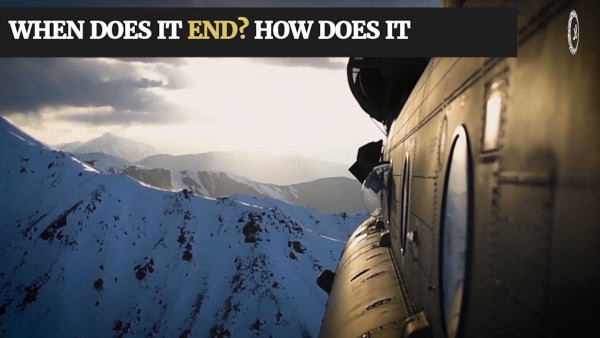

You know what they say: If at first you don’t succeed, keep plodding on for two decades with no hope for victory.
That’s the story about the Afghanistan war in a nutshell.
Despite the fact that recruits will soon enter boot camp to train to fight in a war that began before they were born, Army Gen. Mark Milley said it is too soon to pull out of Afghanistan.
“I think pulling out prematurely would be a strategic mistake,” Milley said during his July 11 confirmation hearing to become the next chairman of the Joint Chiefs of Staff.’
In fairness to Milley, he was repeating the language used by Sen. Angus King (I-Maine), who asked if a premature withdrawal of U.S. troops from Afghanistan would undermine ongoing peace negotiations between the United States and the Taliban.
Your friend and humble narrator may be bad at math, but it seems strange to call any withdrawal of U.S. troops from nearly 18 years premature. (Especially when a poll by the Pew Research Center found that 58 percent of veterans surveyed said the Afghanistan war has not been worth the sacrifice.)
For those of you too young to remember, here is a brief summary of everything that has happened in Afghanistan since September 2001:
- Roughly 15 minutes after special operations forces pulled off an outstanding victory against the Taliban, President George W. Bush – the epitome of the distracted boyfriend meme – turned his focus toward his arch nemesis Saddam Hussein. For the rest of the Bush administration, Afghanistan was starved of troops and other resources, allowing the Taliban to come back like a bad case of herpes.
- Like Bush, President Barack Obama failed to distinguish himself when it came to Afghanistan. Obama inherited a losing war and after a painful strategic review in 2009, he decided the United States goal was no longer to defeat the Taliban but to degrade them to the point the Afghan government could take over the war. The troop surge came with an end date. The Taliban waited U.S. troops out.
- Now, President Donald Trump has made clear he wants all U.S. troops out of Afghanistan and U.S. special envoy Zalmay Khalilzad – a.k.a. “Neville Chamberlain 2.0” – is negotiating a face-saving exit along the lines of Vietnam, Lebanon, and Somalia so the Taliban can go in for the kill.
The question is what happens now. Milley said the U.S. military should stay in Afghanistan until a negotiated settlement is reached with the Taliban.
“I think it is slow; it’s painful; it’s hard – I’ve spent a lot of my life in Afghanistan,” Milley said. “But I also think it’s necessary.”
Milley also noted that the United States’ initial reason for invading Afghanistan was to make sure the country would never again be used as a base for a terrorist attack on the homeland.
Since there hasn’t been such an attack since 2001, “We’ve been successful to date,” he said.
That’s one way of looking at it. Another way might be something like this: U.S. service members continue to fight and die in Afghanistan because the military’s top leaders don’t have a better idea about what to do.
Retired Army Gen. Stanley McChrystal, who briefly led all U.S. and NATO troops in Afghanistan, admitted as much when he said his suggestion to Secretary of State Mike Pompeo was to keep a small number of troops remain in Afghanistan to, “Muddle along and see what we can do.”
The lack of strategic vision by the military, Congress, and White House is absolutely shocking.
Imagine Army Gen. Dwight D. Eisenhower telling President Franklin Delano Roosevelt that his plan to defeat the Nazis was to, “Muddle along in Normandy and see what we can do.”
It is clear that the United States’ goal of creating a liberal democracy in Afghanistan has failed, said Jacqueline L. Hazelton, an assistant professor in the department of strategy and policy at the U.S. Naval War College.
One chance for political stability is for one of the warring sides to achieve a decisive victory over the other, said Hazelton, whose comments do not reflect the views of any government entity.
“It is well past time to withdraw U.S. troops from Afghanistan,” Hazleton said. “If the U.S. military presence was going to enable the Afghan government’s success against the Taliban, we would have seen progress by now. Instead, through its good intentions, the United States has prolonged the war.”
However, this Pentagon correspondent can understand why the generals are loathe to pack up and leave Afghanistan. Given the Taliban’s track record on human rights, they are likely to be as genocidal as Cambodia’s Khmer Rouge if Kabul falls.
So the Taliban are definitely evil, but it’s time for the generals to tell the president that if the United States is not trying to win in Afghanistan it’s not worth fighting there anymore. And if the war cannot be won, it’s long past time to admit the United States lost its best chance to save Afghanistan when President Bush decided to restore his family’s honor.
UPDATE: This story has been updated to more accurately reflect Jacqueline L. Hazelton’s comments about Afghanistan.
SEE ALSO: Here’s the real story behind the top general in Afghanistan’s .45 pistol
WATCH NEXT: Marine Corps Commandant: ‘We’re The Mujahideen’ In Afghanistan
Jeff Schogol covers the Pentagon for Task & Purpose. He has covered the military for 14 years and embedded with U.S. troops in Iraq and Haiti. Prior to joining T&P, he covered the Marine Corps and Air Force at Military Times. Comments or thoughts to share? Send them to Jeff Schogol via email at schogol@taskandpurpose.com or direct message @JeffSchogol on Twitter.